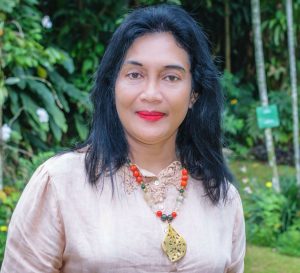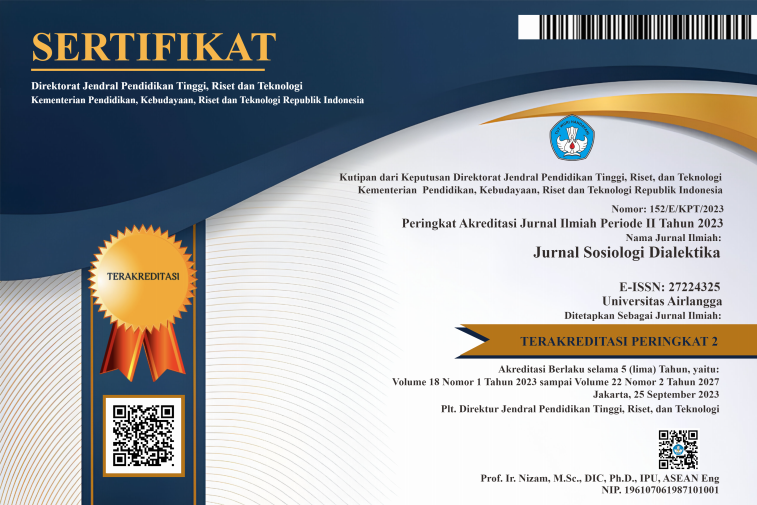The role of women in the management of Family Hope Program fund in Surabaya
Downloads
This study examines the role of women in the utilization and management of the Family Hope Program fund and describes the process of gender relations constructed in beneficiary families in Surabaya. This qualitative study has two objectives, namely: (1) identifying the role of women in the utilization and management of Family Hope Program funds in Surabaya; and (2) describing the process of gender relations constructed in the beneficiary families. The results indicate that the role of women in managing Family Hope Program funds in Surabaya remains stagnant. Women benefiting from the fund plays a dual role of working in formal and informal sectors and carrying out domestic functions such as caring for babies, cooking, and the likes. These women do not carry out the role in managing the Family Hope Program fund as they are supposed to, such as managing finances and planning needs and spending. This indicates that men still dominate the role of determining the amount of allocation, whereas women are only executors. In addition, the Family Hope Program still cannot restructure the existing gender relations among the people of Surabaya. The program also does not change the pattern of gender relations in decision making in the household. This can be seen from family planning participation. Women benefiting from the fund are reluctant to use family planning contraception due to the husband's prohibition.
Adato M & Hoddinott J (2010) Conditional Cash Transfers In Latin America. Baltimore: International Food Policy Research Institute.
Ahl H (2004) The Scientific Reproduction of Gender Inequality: A Discourse Analysis of Research Texts on Womens Entrepreneurship. Stockholm: Liber.
Aji MS (2019) Implementasi Program Kampung Keluarga Berencana dalam Upaya Peningkatan Efektivitas Program Keluarga Berencana (Studi Pada Kampung KB RW 12 Sidotopo, Kelurahan Sidotopo, Kecamatan Semampir, Surabaya). Thesis: Universitas Airlangga.
Ariadi S & Sudarso (2018) Pengembangan Badan Usaha Milik Desa (BUMDes) di Jawa Timur. Jurnal Sosiologi Dialektika 13 (2): 169-182.
Arif S, Syukri M, Isdijoso W, Rosfadhila M & Soelaksono B (2011) Are conditions pro-women? A case study of a conditional cash transfer in Indonesia. Center for Social Protection Research Report 3:37-66.
Budiman A (1985) Pembagian Seks Secara Seksual. Jakarta: PT. Gramedia Jakarta.
Cahyadi N, Hanna R, Olken BA, Prima RA, Satriawan E & Syamsulhakim E (2018) Cumulative impacts of conditional cash transfer programs: Experimental evidence from Indonesia. National Bureau of Economic Research.
Calvo C (2011) Social work and conditional cash transfers in Latin America. Journal of Sociology and Social Welfare 38:53.
Clark R, Ramsbey TW & Adler ES (1991) Culture, gender, and labor force participation: A cross-national study. Gender and Society:47-66.
De Brauw A, Gilligan DO, Hoddinott J & Roy S (2014) The impact of Bolsa Família on women's decision-making power. World Development 59:487-504.
Dehani M, Hernawan D, & Purnamasari I (2018) Evaluasi Program Keluarga Harapan (FHP) di Kecamatan Bogor Selatan Kota Bogor. Jurnal Governansi 4 (1):45-56.
Galiani S & McEwan PJ (2013) The heterogeneous impact of conditional cash transfers. Journal of Public Economics 103:85-96.
Gitter SR & Barham BL (2008) Women's power, conditional cash transfers, and schooling in Nicaragua. The World Bank Economic Review 22 (2):271-290.
Hatta ZA & Sarkawi DT (2011) The Poverty situation in Indonesia: Challenges and progress of the marginalized group. Asian Social Work and Policy Review 5 (2):92-106.
Hutagalung SA, Sirojuddin A & Widjajanti I (2009) Problems and challenges for the Indonesian Conditional Cash Transfer Programme–Program Keluarga Harapan (FHP), SPA Working Paper 04, May 2009, Brighton: IDS.
Kalev A & Deutsch G (2018) Gender inequality and workplace organizations: Understanding reproduction and change. In Handbook of the Sociology of Gender (pp. 257-269). Springer, Cham.
Kholif KI (2014) Implementasi Program Keluarga Harapan (FHP) dalam menanggulangi kemiskinan di Kecamatan Dawarblandong Kabupaten Mojokerto. Jurnal Administrasi Publik 2 (4):709-714.
Khotimah K, Ratnasari V & Ratna M (2019) Pengelompokan kelurahan di Kota Surabaya berdasarkan kriteria pembentukan Kampung Keluarga Berencana. Jurnal Sains dan Seni ITS 7 (2): 122-128.
Kwon HJ & Kim WR (2015) The evolution of cash transfers in Indonesia: Policy transfer and national adaptation. Asia & the Pacific Policy Studies 2 (2):425-440.
Linjamsos D (2013) Pedoman Umum Program Keluarga Harapan (FHP). Jakarta: Kementrian Sosial RI.
Mather CE (1983) Industrialization in the Tangerang Regency of West Java: Women workers and the Islamic patriarchy. Bulletin of Concerned Asian Scholars 15 (2):2-17.
Nazara S & Rahayu SK (2013) Program Keluarga Harapan (FHP): Indonesian conditional cash transfer programme. International Policy Centre for Inclusive Growth.
Neuman WL (2016) Understanding Research. Pearson.
Purwanto SA, Sumartono S & Makmur M (2013) Implementasi kebijakan Program Keluarga Harapan (FHP) dalam memutus rantai kemiskinan (Kajian di Kecamatan Mojosari Kabupaten Mojokerto). WACANA: Jurnal Sosial dan Humaniora 16 (2):79-96.
Puspitawati H (2010) Analisis structural equation modelling tentang relasi gender, tingkat stres, dan kualitas perkawinan pada keluarga penerima Program Keluarga Harapan (FHP). Yinyang: Jurnal Studi Islam Gender dan Anak 5 (2):328-345.
Radel C, Schmook B, Haenn N & Green L (2017) The gender dynamics of conditional cash transfers and smallholder farming in Calakmul, Mexico. In Women's Studies International Forum 65:17-27 Pergamon.
Rahminawati N (2001) Isu kesetaraan laki-laki dan perempuan (bias gender). Mimbar: Jurnal Sosial dan Pembangunan 17 (3):273-283.
Setijaningrum E (2013) Desain Program Terpadu Penanggulangan Kemiskinan di Perkotaan. Surabaya: Airlangga University Press.
Spierings N (2014) The influence of patriarchal norms, institutions, and household composition on women's employment in twenty-eight Muslim-majority countries. Feminist Economics 20 (4):87-112.
Suntiana L, Kanto S & Soenyono S (2015) Rancangan model kebijakan penanggulangan kemiskinan dalam perspektif pemberdayaan perempuan (Kajian terhadap implementasi Program Keluarga Harapan di Kecamatan Sumberbaru Kabupaten Jember). WACANA: Jurnal Sosial dan Humaniora 18 (3).
Susanti E (2007) Ketimpangan Gender dan Ketidakberdayaan Perempuan Miskin Perkotaan. Surabaya: Insan Cendekia.
Syukri M, Sirojuddin A, Meuthia R & Widjajanti I (2010) Making the best of all resources: How Indonesian household recipients use the CCT allowance. IDS Bulletin 41 (4):84–94.
Yuwinanto HP (2018) Pelatihan keterampilan dan upaya pengembangan UMKM di Jawa Timur. Jurnal Sosiologi Dialektika 13 (1):79-87.
1. Copyright of this journal is possession of Editorial Board and Journal Manager, by the knowledge of author, whilst the moral right of the publication belongs to the author.
2. Legal formal aspect of journal publication accessibility refers to Creative Commons Attribution-NonCommercial-ShareAlike (CC BY-NC-SA), implies that publication can be used for non-commercial purposes in its original form (cannot be modified).
3. Every publications (printed/electronic) are open access for educational purposes, research, and library. Other that the aims mentioned above, editorial board is not responsible for copyright violation.















